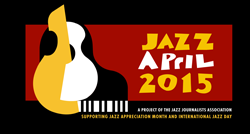
Recent NEA Jazz Master is among best drummers ever
It was nice to see the recent National Endowment for the Arts annual Jazz Masters awards ceremony and concert broadcast online recently from the Jazz at Lincoln Center. All the honorees were fitting, and all--the ones present--eloquent. Particularly trumpeter Jimmy Owens speaking about the needs of aging musicians (and the lack of support from jazz club owners in that regard), and the good works of the Jazz Foundation of America.
Among this year’s class, that includes Von Freeman, Owens, Sheila Jordan and Charlie Haden, the one that stands out for me is drummer Jack DeJohnette. And what prompts these reflective remarks is listening to a CD received today by the excellent pianist Luis Perdomo, titled Universal Mind,(RKM Music) a trio outing with Drew Gress on bass and DeJohnette on drums. DeJohnette is enlightening on the drums. As always.
And it reminds me of what I have been telling people for some time. DeJohnette is the best drummer on the planet. In spite of how unreasonable it is to use such a term “best” in any endeavor, particularly art. There are sooooo many fine drummers out there, and superb young guys coming up like Kendrick Scott, Eric Harland, Marcus Gilmore, Johnathan Blake, Rudy Royston, Jamire Williams, Justin Faulkner and on and on and on. But listen to DeJohnette albums, or those of the Keith Jarrett Trio, or whomever. Miles at the Isle of Wight. Or see Jack with any of his fine formations.
See Jack Play.
[Photos: Above, Jack DeJohnette at Freihofer’s Saratoga Jazz Festival, 2011. Below, Luis Perdomo and Drew Gress playing with Ravi Coltrane’s quarter at the Newport Jazz Festival, 2011. © R.J. DeLuke]
Sheee-it. It’s mesmerizing. And always so musical, even at his most volcanic.
The Perdomo disk, which will be released on Valentine’s Day, is a helluva recording. Check it out when possible. DeJohnette’s playing is so compelling, matching neatly with Perdomo, who is also consistently terrific. It’s always thus.
At Freihofer’s Saratoga Jazz Festival in 2007, with Trio Beyond -- guitarist John Scofield and organist Larry Goldings joining Jack -- it was hard to keep one’s eyes off the drummer and the waves of sound (not to be confused with sound waves) that came from his drum kit. Last year’s Saratoga fest featured DeJohnette’s group with sax fiend Rudresh Mahanthappa, kicked ass, propelled, of course by the force of Jack. The Force of Nature. The Natural.
And nothing is more natural than DeJohnette’s playing, even when frantic.
He’s a total musician, having been trained as a classical pianist during his upbringing in Chicago. At a concert with guitarist John Abercrombie and bassist Ron McClure in 1977, in a small auditorium on the campus of Utica College of Syracuse University, DeJohnette spontaneously left his chair behind the drums, walked over to a piano that was pushed aside for the trio -- not part of the show -- and started wailing. It was impressive.

Everything about Jack is impressive. (Check out John Kelman’s excellent story on DeJohnette at All About Jazz). Pick up any album. And by all means see him and his bands.
“I consider myself a world musician,” he told me in a 2007 interview. “No matter what the instrument is, you’re a musician. You’re playing music on the instrument. I consider myself a world musician or world drummer. It’s not set in stone. It’s always pliable. It’s always changing.” Regarding his being held in high esteem by the next generation of drummers: “It’s nice to be respected and appreciated that way. It inspires me to keep doing more of what I’m doing. More experimenting, keep challenging myself and just doing the best every time I’m playing the music.”
He sure does.
At the NEA ceremony, DeJohnette was also impressive expressing his thoughts. He spoke of music being a vital part of the “emotional and spiritual development of people.” He spoke of an artist’s responsibility to always address that. He noted that times have changed since his musical growing up in the turbulent 1960s and 1970s, but “one thing that we should never lose is a commitment to the highest level artistry and integrity an individual can add to the collective voice … In a mediocre world this is more important than ever.”
Amen.
And DeJohnette is Always holding up his end of the bargain.





